
From the moment NYU Shanghai opened its doors in 2013, faculty, students, administrators and the public knew that this university would be different, an audacious educational start-up that would fuse the global achievements and ambitions of its two partner universities-- New York University (NYU) and East China Normal University (ECNU).
Three years later, the first class is preparing to graduate, the first beneficiaries of the school’s innovative, cosmopolitan approach to undergraduate education. Ten research institutes are generating collaborative, cutting-edge research in their fields. And more than 100 articles have already been published in internationally recognized journals.
With 1,200 students and 140 faculty members, the university is well down the road to its long-term targets of 2,000 undergraduate students and 250 professors. The next focus will be on expanding the masters and doctoral programs.
The success of NYU Shanghai’s original model is already sparking reflection at top institutions of higher education around the world.
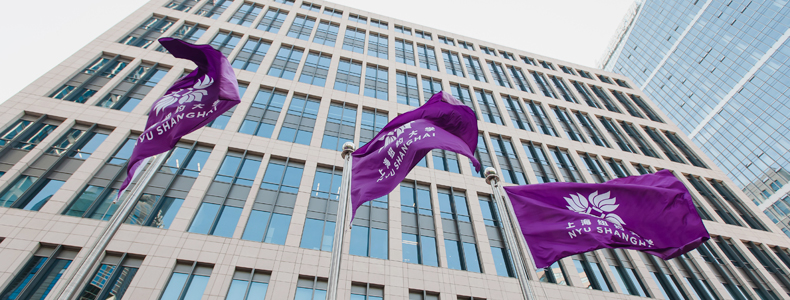
The Model
Of the 300 students in each class, 151 are from 31 provinces China, and 149 are from abroad, representing 66 countries in total. Classes are taught in English, but all non-Chinese students must learn Chinese. Students spend their first two years in Shanghai, their third year on one of NYU’s other campuses around the world, and their fourth year back in Shanghai where they will graduate. Students may not choose a major until their second year.
The university is not divided into traditional schools and departments. Faculty members have all achieved distinction in a traditional discipline, but their intellectual interests transcend disciplinary boundaries. As a result, some majors, like mathematics, are very familiar, while others, like Interactive Media Arts, blend multiple methodological traditions. All first-year students are required to take Global Perspectives on Society, which explores political philosophy, economics, sociology, and intellectual history from multiple cultural perspectives. And a foundational course in science, combines biology, chemistry, and physics.
In addition, new programs like the Center for Global Asia and the Program on Creativity and Innovation have stimulated faculty to develop provocative new courses like Choreography and Virtual Reality; Food and Enlightenment; and Neuroscience and Social Justice.
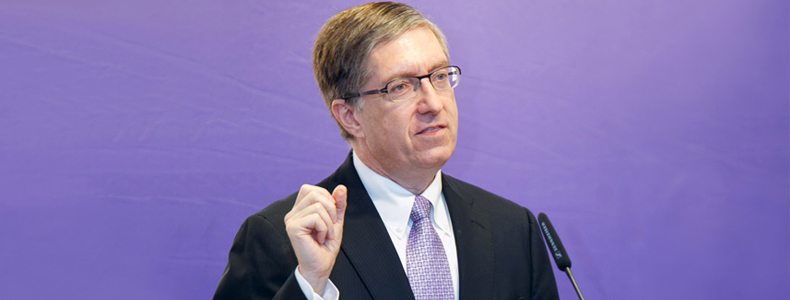
Vice Chancellor Jeffrey Lehman has been a leader in the changes to global higher education over the last several decades. Before joining NYU Shanghai, he served as Dean of the University of Michigan Law School; as President of Cornell University, and as founding Dean of the Peking University School of Transnational Law. In each role, he stressed the importance of preparing students to be effective when crossing national and cultural boundaries. “This is a special time in the world of higher education,” he says. “Globalization, information and communications technologies, and the reengagement of China with the world have all changed what today’s students need; they have also given us exciting new ways to meet that need.”
Chancellor Yu Lizhong was President of the East China Normal University from 2006 to 2012, before becoming Chancellor of NYU Shanghai. He agrees. “The world is changing so rapidly. We have an obligation to help our students understand this new world. This is especially important for Chinese students. In the last 30 years, the Open Door Policy in China has created many more connections between China and the world. Our kids are interested in the world in new ways. But it is not only information they seek. They can read textbooks for that. They need to experience other cultures firsthand.”
“This is the mother of all educational start-ups,” says Professor Eitan Zemel, Associate Vice Chancellor for Strategy at NYU Shanghai, and Vice Dean of Global and Executive Education at NYU Stern. “It’s a first -- so big, so audacious, and so complex. It is, for all of us, a professional paradise.”
For the students and faculty embarking on this new venture, NYU Shanghai offers a cosmopolitan approach to liberal education, as well as state-of-the-art research opportunities. “We want our students to feel comfortable all over the world, and we consider this an important part of an educated person’s skill set,” says Professor Zemel.
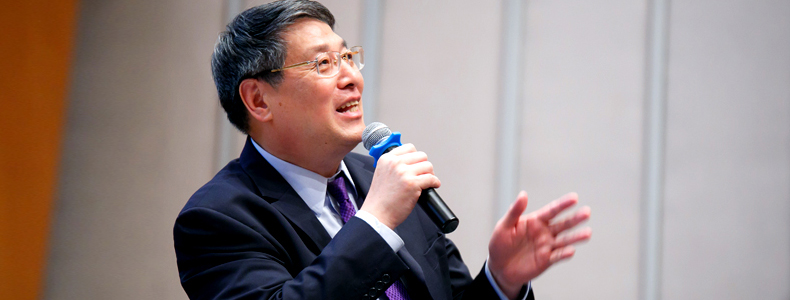
Why Now?
This kind of university would of course not have been possible 50 years ago. Over the past half century, the destinies of the U.S. and China have converged, even as the digital revolution furnished new ways of gathering and imparting data. Much has been discovered about how best to facilitate student learning. “It is natural,” reports Vice Chancellor Lehman, “that students and faculty would both be drawn to an institution that is not static but flexible and responsive to changes in technology, pedagogy, and global economic realities.”
NYU Shanghai embodies a number of changes for the world of Chinese higher education that it contributes to. These changes range from the admissions process, to an educational philosophy steeped in the values of liberal education, to a pedagogy of “active learning.”
“For the Chinese students,” explains Chancellor Yu, “NYU Shanghai’s admissions system represents an alternative to the Gaokao model.” Chinese students must still take the Gaokao before applying, but once they are here, it’s a completely different evaluative process. Rather than being assessed solely by exams, students are evaluated on their performance, their creativity, their interactions with their peers and the faculty. And they are learning all the time—with their English-speaking roommates, in the clubs they’ve joined, and in their research.
“The teaching style is also very different,” says Chancellor Yu, “from traditional Chinese teaching, in which professors impart information to the students. This is far more active—there is discussion, debate, and an emphasis on critical thinking. This can be a challenge for Chinese students.”
Faculty at NYU Shanghai have the opportunity to team-teach courses such as Philosophy and Technology, and Neuroscience and Economics. The curriculum is designed for intellectual cross-pollination, a trend in higher education in both the U.S. and China. Joanna Waley-Cohen, Provost and Julius Silver Professor of History at NYU Shanghai, helped design the curriculum at NYU Abu Dhabi and at NYU Shanghai. “It’s wonderful to work on a clean slate,” she says. “You can do something new without 55 committee meetings!”
“We’ve built and adjusted our curriculum to meet students’ needs and desires, with new majors such as one currently in preparation that combines Interactive Media Arts with Business so that students can both learn business basics and follow their hearts.”

Interdisciplinary and International
NYU Shanghai is well positioned to contribute to new fields that are emerging from the interactions among older academic disciplines. Consider, for example, computational neural science. ECNU has a strong research tradition in the cognitive sciences. And NYU has been at the forefront of studies in artificial intelligence. Faculty associated with NYU Shanghai are collaborating to explore new ways to model and understand the brain. (hyperlink to story about Brain science)
This kind of multinational, multidisciplinary collaboration is becoming more and more the norm. So many of the problems we face today, explains Vice Chancellor Lehman, affect the entire world and require expertise in many different disciplines. Professor David McLaughlin, former Provost of New York University and Chief Science Mentor at NYU Shanghai, agrees. “Today, a truly educated person must be both interdisciplinary and international.”
New courses, like the first year, Global Perspectives on Society, or Where the City Meets the Sea, or the combined Physics, Biology, Chemistry class are all examples of the cross-disciplinary foundation NYU Shanghai has created in the last four years.
“By the spring of freshman year,” reports Provost Waley-Cohen, “you can see the light bulbs turning on.”
“Creativity is now a measure of greatness,” says Provost Waley-Cohen. “If we can help students bring seemingly disparate elements together in new ways, we’ll be helping them to develop an important skill for today’s world.”
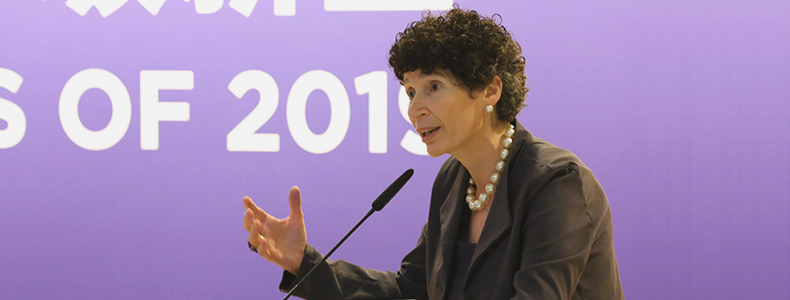
Early Pioneers
Vice Chancellor Lehman speaks about how gratifying it has been to see truly gifted teachers take a leap of faith and come to NYU Shanghai, to participate in what he calls “dream-building.” “
We’ve built a very strong faculty base in Shanghai,” says Professor McLaughlin, taking advantage of “a high degree of connectivity with NYU in New York.” “This is a tremendous opportunity for faculty,” says Professor Zemel. “The impact they can have in China is so much bigger than the impact they can have in the U.S.”
NYU Shanghai’s leaders feel the same way about the students who have helped to build a new university. Provost Waley-Cohen remembers the first day the university opened in 2012. The faculty gathered to meet the students. “Do you think anyone will show up?” she recalls asking a colleague. All breathed a sigh of relief at the sight of the first student. “I am proud,” she says, “of the slow, steady way we have grown.”
Chancellor Yu admires the pioneering first cohorts of students. “They know what they want from the world. And it is not always money. The local community loves these students. They say they are self-directed, motivated, and hard-working.”
“NYU Shanghai has brought a new energy to education,” says Chancellor Yu. “American students may be used to this energy, but for Chinese students it is quite new.”
“I have a student who is graduating this year,” Chancellor Yu recounts. “She did an internship with a bank and they love her. They would hire her. When I asked her what she wanted to do, she didn’t mention money or location. She told me she hoped to find a job that would interest her and make her happy. ‘This is something I learned at NYU Shanghai,’ she said. This makes me very proud of the work we have done here.”
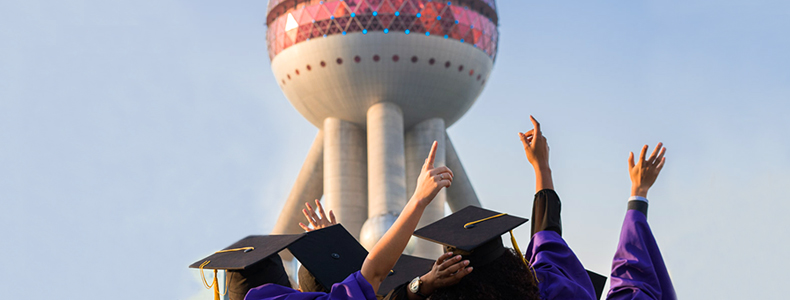
Hopes for the Future
NYU Shanghai’s leaders are looking forward to the school’s continuing growth and development. They expect to build more graduate programs in partnership with NYU New York. And they expect to broaden and deepen their linkages with Shanghai and with China.
“China’s economy is shifting from infrastructure and exports to more domestic consumption,” says Vice Chancellor Lehman. “They will have to build a welfare state and improve their financial infrastructure. NYU has spectacular scholars who can help the Chinese government make these changes.”
“You aren’t given the opportunity to start a research university from whole cloth more than once in a lifetime,” says Professor McLaughlin. “All of us who have had the opportunity to be part of this adventure think of it as a great privilege.”
Article By Susan Salter-Reynolds

